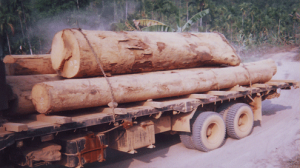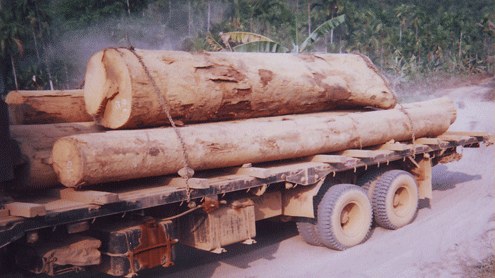By LAWI WENG – Over one hundred furniture factories in Three Pagodas Pass have closed temporarily due to a shortage of timber. Currently, the Karen National Union (KNU) has forbidden logging in their areas of control while the conflict persists between the KNU and the Burmese army.

Three Pagodas Pass resident, Thu Rain, explained that there are 138 furniture factories in town and only 10 factories are running regularly.
“KNU does not allow the factories to continue logging. This is why they can not run their factories,” he said.
Last year, the KNU granted logging contracts to Burmese businessmen allowing them to cut down over 1,000 tons of ironwood. Burmese business tycoon, Tay Za, reaped the benefits of these contracts with his Htoo Trading Company last year.
However, KNU has banned logging during the military offensives by junta troops, which are currently being launched against the Karen National Liberation Army (KNLA, the armed wing of KNU) Brigade 6’s control area.
Nai Tun, a timber businessman in Three Pagodas Pass, said, “I do not have even one tree left to sell now, if you wished to come and buy it from me, because KNU does not allow us to log.”
“I have many tons of timber that remain in the jungle, which I cut down last year and prepared to sell this year. But, I can not bring it now,” he said.
The Forestry Ministry in Three Pagodas Pass collected 30,000 tons of hardwood, including teak and ironwood last year, which was to be used at furniture factories in Three Pagodas Pass this year.
Quite quickly though, the wood ran out in December despite the intent last year to use the remaining wood for the current year.
“The factories here use about 50 tons [of wood] a day. So, how could we have enough wood?” asked Thu Rain.
The shortage of wood has forced most of the factories to close down as they are receiving no revenue. As a result of the shortage, the price of hard wood has increased as well.
The going price for ironwood is 24,000 baht now, though last year in March, it was only 9,000 baht. One ton of softwood, on the other hand, is 11,000 baht currently, whereas it was 4,500 baht last year.
Local rubber plantation owners have cut down some of their small trees to sell as hardwood to the furniture factories. This poses a threat to the extinction of hardwood in the area, as well as damaging the environment while the earth gets hotter and experiences more droughts.
On February 8th, the Burmese authorities from the Forestry Ministry, the Furniture Committee, and the Burmese army held a meeting in which they forbade furniture factory owners to cut down small hardwood trees. If they do so, their actions will be met with punishment.
“They [the Burmese authorities] said that it is too late. It is very hot here because there are no big trees. If they allow the cutting down of small trees, the drought will only increase,” explained Thu Rain.
For those people who wish to build houses in Sangkhlaburi, situated 18 kilometers from Three Pagodas Pass, it has become difficult to find hardwood. Normally, hardwood is transported from Three Pagodas Pass to Sangkhlaburi.
Nai Rubby, who built a new house last week in Sangkhlaburi, said, “One ton of ironwood in Sangkhlaburi is about 30,000 baht currently.
“It is difficult to buy wood here. If you have money, you can buy gold any time, but you can not buy hardwood,” he said.
Furniture is Three Pagodas Pass’s main business, normally exporting furniture and lacquer to Thailand. There are around 7,000 households in Three Pagodas Pass.
Hardwood only can be found in the KNLA Brigade 6 control area as it does not exist anymore in the New Mon State Party (NMSP)’s areas of control.
NMSP control areas have much less jungle as it was used for logging during the 15 year ceasefire between the NMSP and the Burmese army. Also, many residents there have begun to grow rubber plantations in those areas.
As an impact of extended logging, residents in the NMSP controlled areas have reported a shortage of water in town for people to buy and drink.
In Palanjapan village, two miles from Three Pagodas Pass, a Thai noodle seller explained that, “there is no water now even though summer has not yet arrived.”
He recalled a time when the villagers had not yet cut down the trees and water was abundant. “In the past, we did not dare go outside the village as there was a deep jungle. But, we cut those trees for three years of the ceasefire,” he said.
During fighting between the Mon and Karen, the Mon used the forest to conceal themselves. But, today, there are no big trees along the range of mountains under NMSP control.
“We do not have deep jungle now. They [the Burmese military] can see us from their military aircraft. I am a little scared if we have to fight them again,” worried a NMSP colonel.

